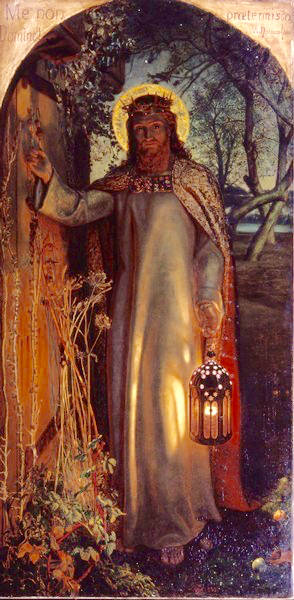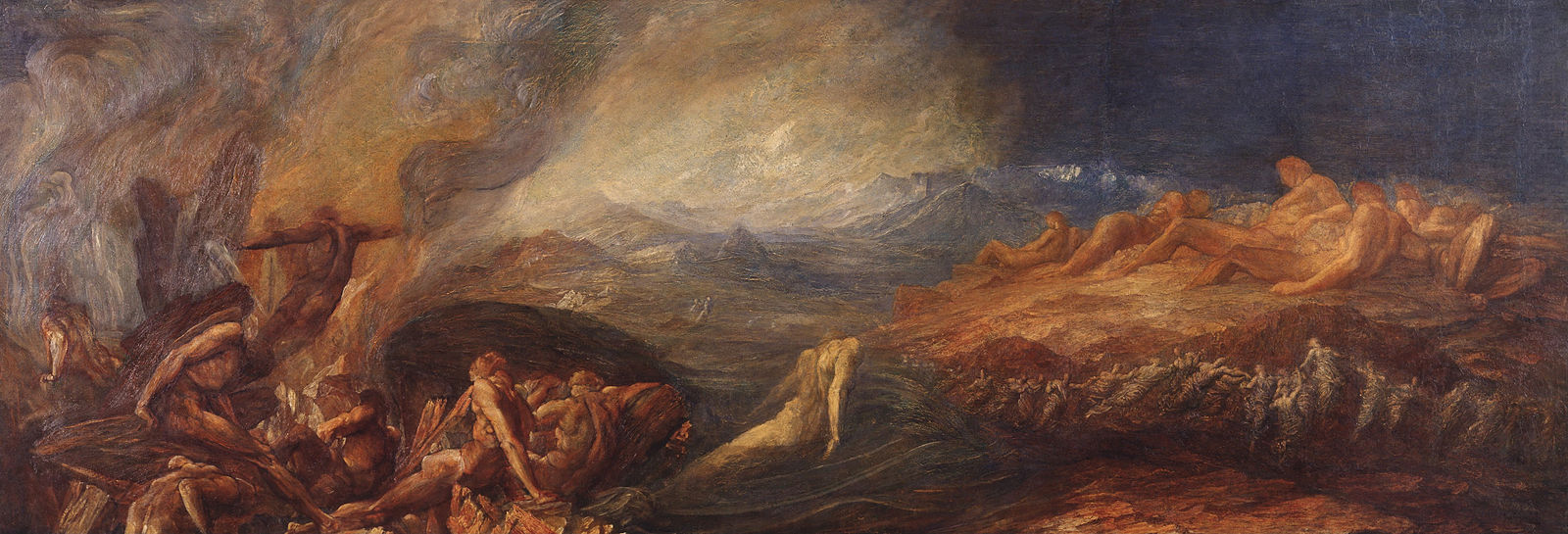I recently had my third COVID vaccination. Having had two shots of the AstraZeneca vaccine earlier this year, I now received the Moderna version as a booster. I am grateful to the scientists and health staff—virologists, geneticists, epidemiologists, nurses, and so forth—that have made this possible in such a short time, many working ridiculously long hours to achieve what some said was impossible, many of whom are Christian believers as well as people from other faiths, highly motivated to use their gifts to help their fellow humans . . . and many based here in my home town of Cambridge. Continue reading “Salt of the earth? A Christian perspective on vaccination”
Rapture theology and the end times
Image: George Frederick Watts, Chaos (c. 1875).
With global anxiety increasing as we face threats in so many areas, how should we—as people of faith—respond?
It is clear that humanity is facing a number of existential crises: sea-levels rising, more frequent “weather events,” insect numbers decimated, oxygen levels in the sea declining, species extinction, plastic pollution, toxic air . . . and the list could go on. When we add to this political posturing, social inequality, the rise of nationalism, and nuclear arms proliferation we end up with the perfect storm. Many are anxious. Is this the end of the world? So prevalent is anxiety in the current climate that one paper recently presented us with the “A-Z of climate anxiety: how to avoid meltdown,” subtitled: “With the climate emergency putting our mental health at risk, Emma Beddington presents an everyday guide to eco wellbeing.” This may, perhaps, result in some personal comfort but offers little hope for the planet. Continue reading “Rapture theology and the end times”
Is the light of Christ being excluded from the church?

In this post, I explore the role of Christ as light-bearer – one who shines in order to dispel darkness. We consider the need for the church to be more self-critical in response.
Holman Hunt’s famous image, Light of the World, is often interpreted as Christ knocking at the door of an unresponsive human heart — a wooden door overgrown with weeds and with no visible external handle. The metaphor is clear. The image, however, raises pertinent questions regarding both subject and object.
Regarding the subject, Hunt’s portrayal of Christ (as a Westerner) dressed in rich, flowing, almost middle-Eastern kingly robes hints at his divine role as the King of Kings. His messianic role and divine nature are reinforced by a jewelled circlet hinting at a crown of thorns and a head haloed by a rising moon. The dark garden scene is reminiscent of an unoccupied Eden. Instead of tending the garden of the world, the soul is barricaded within its own alternative, self-preoccupied reality. A kind of garden shed. Continue reading “Is the light of Christ being excluded from the church?”
Acid reign
Dealing with corrosive power-structures in a post-truth world
I feel like apologising for this post. It is too wordy and, at times, a bit pretentious. I’ve left it here as it represents another milestone on the journey. There is some good stuff!
Even the most naive political observer cannot help but notice the rise of populism worldwide. Self-appointed saviours declare that they will save their people from oppressive overlords and lead them towards new promised lands — a misguided response to the cry of those who feel oppressed. I would like to offer a theological perspective.
God’s truth police – a consequence of fundamentalism
Rob Bell’s book Love Wins has provoked a predictable (and somewhat tiresome) debate among Christians, with accusations of universalism, heresy, and the erosion of truth taking centre stage. (The idea that God might be nice seems to be a shock for many.) As I read the vitriolic comments it appears to me that a central issue remains unaddressed, and it concerns the heart of Christianity — truth. Continue reading “God’s truth police – a consequence of fundamentalism”
Reading the Bible again
A brief exploration of truth and the Bible
Nick Clegg, according to the Daily Mail, is a devious politician who has thrown away his principles in favour of power and personal aggrandisement. Is this true? Thousands of Daily Mail readers no doubt view this as as indisputable fact, but surely there must be more to this than meets the eye? As someone who, for better or for worse, chose to take his party into a coalition with previous political enemies, there must be deeper issues here; Clegg is no doubt having to walk a very difficult tightrope, balancing principles against the fact that he is the leader of a minority within this fragile coalition. I prefer to give him the benefit of the doubt — that deep down he has the interests of the nation at heart.
This simple example illustrates how we are so easily swayed by words that are in print — accepting them as truth simply because someone has decided they are worth printing. Even though we know that media barons print stories simply to sell papers, and journalists are sometimes not the most truthful of people, still we are deeply affected by what we see in print. Continue reading “Reading the Bible again”
Where’s home?
The art world, like the Christian world, is full of ‘isms’. There is impressionism, realism, surrealism and so on, most of which are recognised as ‘art’. Occasionally, of course, someone like Damien Hirst or Marcel Duchamp come along — the latter exhibiting an upside-down urinal in a Paris art exhibition — who challenge our understanding of what art is. Christianity’s ‘isms’ are similarly sets of rules, beliefs, creeds, philosophies and so on that consider themselves sub-sets of the genre ‘Christianity’, and, as in the art world, some of the more orthodox ‘isms’ are considered Christian, others on the fringe are considered — like Duchamp’s urinal — somewhat suspect, or perhaps even a joke. Most ‘isms’ develop when a group of people coalesce around shared values, often with a charismatic personality at the centre and, as in the world of art, often result when someone surfaces who challenges the status quo. Continue reading “Where’s home?”

